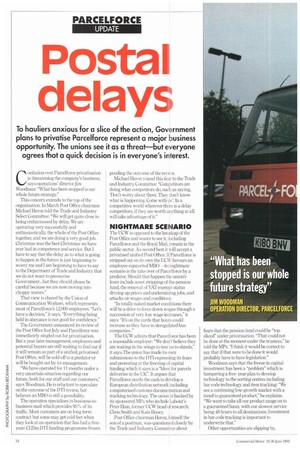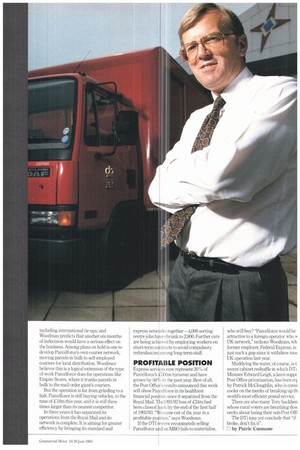Postal delays
Page 36

Page 37

If you've noticed an error in this article please click here to report it so we can fix it.
To hauliers anxious for a slice of the action, Government plans to privatise Parcelforce represent a major business opportunity. The unions see it as a threat—but everyone agrees that a quick decision is in everyone's interest.
C°illusion over Parcelforce privatisation is threatening the company's business, says operations director Jim Woodman: "What has been stopped is our whole future strategy."
This concern extends to the top of the organisation In March Post Office chairman Michael Heron told the Trade and Industry Select Committee: "We will get quite close to being embarrassed by delay. Weave operating very successfully and enthusiastically, the whole of the Post Office together, and we are doing a very good job. Christmas was the best Christmas we have ever had in competence and service. But I have to say that the delay as to what is going to happen in the future is just beginning to worry me and I am beginning to have to say to the Department of Trade and Industry that we do not want to pressurise Government...but they should please be careful because we are now moving into choppy waters."
That view is shared by the Union of Communication Workers, which represents most of Parcelforce's 12,000 employees. "Let's have a decision," it says, "everything being held in abeyance is not good for confidence."
The Government announced its review of the Post Office last July and Parcelforce was immediately singled out for privatisation. But a year later management, employees and potential buyers are still waiting to find out if it will remain as part of a unified, privatised Post Office, will be sold off to a predator or will be bought out by its management.
"We have operated for 11 months under a very uncertain situation regarding our future, both for our staff and our customers," says Woodman. He is reluctant to speculate on the outcome of the DTI review, but believes an MBO is still a possibility.
The operation specialises in busi ness-tobusiness mail which provides 95% of its traffic. Most customers are on long-term contract but some may get cold feet when they look at an operation that has had a five, yearl.C125m DTI funding programme frozen pending the outcome of the review.
Michael Heron voiced this fear to the Trade and Industry Committee: "Competitors are doing what competitors do, such as saying, 'Don't worry about them. They don't know what is happening. Come with us'. In a competitive world wherever there is a delay competitors, if they are worth anything at all, will take advantage of it."
NIGHTMARE SCENARIO Tile um is opposed to the breakup of the Post Office and wants to see it, including Parcelforce and the Royal Mail, remain in the public sector. As second best it will accept a privatised unified Post Office. If Parcelforce is stripped out on its own the UCW favours an employee supported MBO—its nightmare scenario is the take over of Parcelforce by a predator. Should that happen the union's fears include asset stripping of the pension fund, the removal of VAT-exempt status driving up prices and undermining jobs, and attacks on wages and conditions.
"In totally naked market conditions there will be a drive to force down wages through a succession of very low wage intreases," it says. "It's on the cards that hours could increase as they have in deregulated bus companies.."
The UCW admits that Parcelforce has been a reasonable employer: "We don't believe they are waiting in the wings to tear us to shreds," it says.The union has made its own submissions to the DTI expressing its fears and protesting at the freezing of capital funding which it says is a "blow for parcels deliveries in the UK". It argues that Parcelforce needs the cash to develop a European distribution network including computerised customs documentation and tracking technology. The union is backed by its sponsored MN who include Labour's Peter IbM, former UCW head of research; Chris Smith and Kate Hooey.
Post Office chairman Heron, himself the son of a postman, was questioned closely by the Trade and Industry Committee about fears that the pension fund could be "top sliced" under privatisation. "That could not be done at the moment under the trustees," he told the MPs. "I think it would be coned to say that if that were to be done it would probably have to have legislation."
Woodman says that the freeze in capital investment has been a "problem" which is hampering a fiveyear plan to develop technology in the sorting centres including bar code technology and item tracking: "We see a continuing low-growth market with a trend to guaranteed product," he explains. "We want to take all our product range on to a guaranteed basis, with our slowest service being 48-hours to all destinations. Investment in bar code tracking is important to underwrite that."
Other opportunities are slipping by, including international tie-ups, and Woodman predicts that another six-months of indecision would have a serious effect on the business. Among plans on hold is one to develop Parcelforce's own courier network, moving parcels in bulk to self-employed couriers for local distribution. Woodman believes this is a logical extension of the type of work Parcelforce does for operations like Empire Stores, where it trunks parcels in bulk to the mail order giant's couriers.
But the operation is far from grinding to a halt. Parcelforce is still buying vehicles, to the tune of £18m this year, and it is still three times larger than its nearest competitor.
In three years it has separated its operations from the Royal Mail and its network is complete. It is aiming for greater efficiency by bringing its standard and express netwbrks together-4,000 sorting centre jobs have shrunk to 2,800. Further cuts are being achieved by employing workers on short-term contracts to avoid compulsory redundancies among long-term staff.
PROFITABLE POSITION
Express services now represent 20% of Parcelforce's 4:500m turnover and have grown by 50%, in the past year Best of all, the Post Officr's results announced this week will show Parcel force in its healthiest financial posit ioc since it separated from the Royal Mail. Thel 991/92 loss of £24m had been clawed back by the end of the first half of 1992/93. "We came out of the year in a profitable position," says Woodman.
If the DTI review recommends selling Parcelforce and an MIX) fails to materialise,
who will buy? "Parcelforce would be attractive to a foreign operator who v UK network," reckons Woodman, wh former employer, Federal Express, is just such a gap since it withdrew al0f. UK operation last year.
Muddying the water, of course, is t: recent cabinet reshuffle in which DTi Minister Edward Leigh, a keen suppc Post Office privatisation, has been ret by Patrick McCloughlin, who is consi cooler on the merits of breaking up th world's most efficient postal service.
There are also many Tory backben whose rural voters are breathing dm necks about losing their sub-Post Offi The DTI may yet conclude that "if broke, don't fix it".
El by Patric Cunnane
















































































